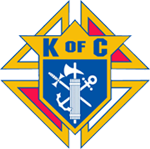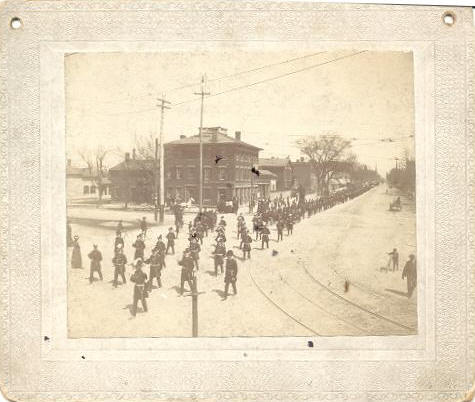
Knights of Columbus
Somerville Council #1432
• 495 East Main Street • Somerville, New Jersey, 08876 • (908) 725-7210 •History
 The Knights of Columbus was founded
by a Catholic priest, Father Michael J. McGivney in New Haven,
Connecticut on February 2, 1882, and incorporated under the
laws of Connecticut on March 29, 1882. Though the first councils
were all in New England, the Order soon spread throughout
the United States in the following years. Today the Order
has active councils in the United States, Canada, Mexico,
and the Philippines.
The Knights of Columbus was founded
by a Catholic priest, Father Michael J. McGivney in New Haven,
Connecticut on February 2, 1882, and incorporated under the
laws of Connecticut on March 29, 1882. Though the first councils
were all in New England, the Order soon spread throughout
the United States in the following years. Today the Order
has active councils in the United States, Canada, Mexico,
and the Philippines.
Fr. McGivney founded the Knights at a time when Catholics were regularly excluded from the unions and men's organizations that provided social support services. The organization was also intended to provide an alternative for Catholics to membership in a Masonic lodge—Freemasonry was discouraged by church hierarchy, and banned by Pope Leo XIII in 1884. The naming of the order after Columbus was partially intended as a mild ridicule of Anglo-Saxon Protestant leaders of the day, who upheld the explorer (an Italian working for Catholic Spain) as an American hero, yet simultaneously sought to marginalize recent Catholic immigrants.
The Knights of Columbus today is a multi-million dollar non-profit charitable organization. Knights may be seen distributing Tootsie Rolls to raise funds to fight mental illness, volunteering for the Special Olympics and other charitable organizations, erecting pro-life billboards and "Keep Christ in Christmas" signs, conducting blood drives and raising funds for disaster victims, or parading at patriotic events with their bright capes, feathered chapeaux, and ceremonial swords. The Knights of Columbus also provide annual funding for the satellite uplink of the Pope's worldwide Christmas address. In many countries that cannot afford satellite downlink, the Order often pays for this as well.
The Knights of Columbus is the world's largest Catholic family fraternal service organization with 1.6 million members. It provides members and their families with volunteer opportunities in service to the Catholic Church, their communities, families and young people.
Back to top
Membership Benefits
As a member of the Knights of Columbus you and your family enjoy many benefits, including 12 free issues annually of the Columbia magazine, the world's largest Catholic family magazine, eligibility to join the Knights of Columbus top-ranked life insurance program, and many more family and personal benefits.Back to top
How to Join
Membership in the Knights of Columbus is open to practicing Catholic men in union with the Holy See, who are at least 18 years old. A practicing Catholic is one who lives up to the Commandments of God and the precepts of the Church. Application blanks a re available from any member of the Knights of Columbus.Back to top
4th Degree
 Any Third Degree member in good standing, one year after the anniversary of his First Degree,
is eligible for membership in the Fourth Degree. The primary purpose of the Fourth Degree
is to foster the spirit of patriotism by promoting responsible citizenship and a love of and
loyalty to the Knights' respective countries through active membership in local Fourth Degree
groups (called "assemblies"). Certain members of the Fourth Degree serve as honor guards at civic
and religious functions, an activity that has brought worldwide recognition to the Knights of Columbus
Any Third Degree member in good standing, one year after the anniversary of his First Degree,
is eligible for membership in the Fourth Degree. The primary purpose of the Fourth Degree
is to foster the spirit of patriotism by promoting responsible citizenship and a love of and
loyalty to the Knights' respective countries through active membership in local Fourth Degree
groups (called "assemblies"). Certain members of the Fourth Degree serve as honor guards at civic
and religious functions, an activity that has brought worldwide recognition to the Knights of ColumbusBack to top
Ladies Auxillary
The Ladies Auxiliary's main function is to SUPPORT the men and the council. They do this primarily by providing help at events, cooking for events and providing monetary help. They also generally do help with setting up and beautifying the hall for events.Back to top
Squires
 Under the guidance of Christian Brother Barnabas McDonald (1865-1929), the first Columbian Squires
circle was instituted in 1925. Membership in the Squires is for Catholic boys between the ages of 12 and 17.
Squires' activities are many, varying from spiritual to active service for the Church and community. Each
circle elects officer members from their own rank, teaching skills of leadership and responsibility.
Under the guidance of Christian Brother Barnabas McDonald (1865-1929), the first Columbian Squires
circle was instituted in 1925. Membership in the Squires is for Catholic boys between the ages of 12 and 17.
Squires' activities are many, varying from spiritual to active service for the Church and community. Each
circle elects officer members from their own rank, teaching skills of leadership and responsibility.
Back to top